Related articles
-
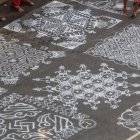 Simple and Easy-To-Create Pongal Kolam Designs To Decorate Your Home Traditionally
Simple and Easy-To-Create Pongal Kolam Designs To Decorate Your Home Traditionally
-
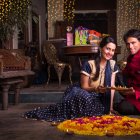 This Diwali, Prepare to Welcome Goddess Lakshmi with a Mix of Traditional and Contemporary Décor: Unique Diwali Decoration Ideas for Your Home to Make It Look Spectacular Like Never Before! (2020)
This Diwali, Prepare to Welcome Goddess Lakshmi with a Mix of Traditional and Contemporary Décor: Unique Diwali Decoration Ideas for Your Home to Make It Look Spectacular Like Never Before! (2020)
-
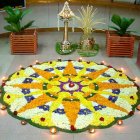 Creating Pookalams is One of the the Most Important Rituals of Onam: Make it Special with these Beautiful Onam Pookalam Designs (2020)!
Creating Pookalams is One of the the Most Important Rituals of Onam: Make it Special with these Beautiful Onam Pookalam Designs (2020)!
Tips on Garba Décor for Navratri
Significance of Garba
A dance form that originated in Gujarat, Garba is usually performed during the 9 day festival of Navratri. Also fondly nicknamed Garbi, its origins are related to the concept of Garbha Deep or Garba, which in Sanskrit usually denotes the womb/light like little earthen lamps. Typically performed in circles around this lamp and the idol of Goddess Shakti, Garba is often confused with Dandiya, another popular dance form performed during the same festivities. Dandiya is performed with colourful sticks as opposed to Garba.
Another symbolic representation of the dance form refers to the dancers’ movement in circles, using their hands and feet in a circular movement, implying to the circle of life which goes around in circles from life to death to rebirth, leaving only Goddess Shakti/Durga invincible and life in general, unmoved and unchanging.
Garba Colours and Attire
Garba is mostly performed in colourful dresses to the rhythm of a drum/dhol, with men, women & children looking vibrant and joyous enjoying the festivities. Being a Gujarati folk dance performed during Navratri, the Garba songs usually revolved around the nine forms/avtaars of Goddess Durga and vary in style from place to place. however, the traditional Garba wear is typically coloured in red, pink, yellow, and orange, teamed up with funky fashion accessories and wooden dandiya sticks.
While the women wear Chaniya Choli, a traditional Gujarati attire made of 3 piece outfit that includes a Choli/Blouse, a Chaniya/Lehenga which is usually a long and flared skirt and an embellished dupatta, the Men folk are dressed in a kediyu (a short round kurta with kafni bottom, a turban/pagdi on their heads and morjris or nagras for footwear). The Chaniya Choli is marked with its colourful designing and use of different forms of embroidery and embellished works, paired with ethnic metal jewelry that includes, earrings, big necklaces, an armband, a waistband, a maang tika and juttis.
Garba Pot Décor
The décor plays a significant role through the entire Navratri rituals of 10 days and 9 nights, celebrated a bit differently in different parts of the country, however, typically inclusive of prayers, chanting of holy scriptures, legendary recitals, story enactments & street plays, and stage décor. Garba pot being the main focus of your Navratri décor, since it is going to be on display through the 9 days’ and then immersed on the 10th day, you can go for decorating it with mirrors in the traditional manner or give it an unusual twist by giving it a marble finish with gold embellishing. Most contemporary contact papers have the pristine white marble options which you can use to mix and match with a red ornate damask designer paper too.
Navratri Garba DIY Décor Ideas
DIY Garba Pot Décor with Neon Colours
Create a gorgeous Garba pot for Navratri yourself and instead of colouring it in the traditional colours of red and gold, go NEON!
- A plain terracotta Garba pot, acrylic colours (white, blue, neon yellow, green, orange, pink), fine art brushes, fabric glue, glass mirrors (round & medium-sized), foil, colour palette, toothpick, BBQ stick and a water container.
- Begin by first washing the pot for a neat outcome and then paint it with a base coat of White acrylic, allowing it to dry completely, before moving ahead. The white acts like a primer. Continue painting dots on the pot in different sizes around the pot’s holes using colours, neon yellow, blue, orange and pink.
- Whilst you’re at it, paint the dots of different sizes using the BBQ stick, the toothpick and the rear side of the brushes, this is called the Dotillism technique. Paint the background of the dots in blue. Leave it all to dry.
- Now, decorate the pot further by gluing the glass mirrors and foil around the carved holes and around the pot’s edges with the fabric glue. Let it dry.
Materials You Require:
Method:
Kalash Decoration with Embellishments
Here’s another DIY Kalash Décor with colourful embellishments for a more festive look during Navratri.
- An earthen pot, supari (betel nut), kalava, leaves, shell (kauri), clear, emerald green, ruby red, orange & yellow rhinestones (different shapes & sizes), golden acrylic color, white acrylic color and sparkle dust for supari, glue.
- Begin by painting the pot in Golden acrylic colour and allow it to dry completely. Take the Kalava Dori next, and tie three parts of it together at the top with a thread and weave the three Doris together into a braid and finish up by tying the loose ends of the Doris together, just like at the top.
- Take one end of the weaved Dori, loop it a little and tie the loop with the thread and then snip the loop off the Dori braid. Continue making and snipping off loops from the braid, till you have all the loops. Now glue the orange and yellow rhinestones on the loops alternatively with the glue and embellish the loops further at organized points on the loop with clear rhinestones.
- Continue the process further by making another Dori braid and then, cut & sew a tiny part of the braid into small circles and embellish them with clear rhinestones. Now glue the required portion of Dori braid around the neck of the pot and then pasting the rest of the braid into v shapes below the neck of the pot, embellishing it all with clear rhinestones.
- Decorate the space between the neck, in between and the V-shaped Doris with the alternating yellow and orange rhinestones and clear stones around them. You can use your creative talent to adorn the pot with these stones as you’d like.
- Continue sticking the embellished Dori loops & circles below the v-shaped ones in a pattern of your choice. Take the betels and coat them with the sparkle dust and embellish the shells with clear rhinestones. Use them all in patterns of your choice on the pot. Now, finish up by sticking the leaves and embellishing them with green rhinestones on the pot neck.
Materials You Require:
Method:
Quilled Garba Decoration
Experiment decorating the Garba Pot with another option of paper quilling.
- A plain terracotta Garba pot, acrylic colours (white, pearl metallic gold), quilling strip (15mm) in pink, a quilling tool, fine art brushes, MR quilling tool, colour palette, light pink coloured thread, pink beads, a pair of scissors and a water container.
- Begin by first coating the pot in white, leave it to dry and then continue painting it in Pearl Metallic Gold.
- The pot will be decorated in varying shades of pink quilling strips, shaped by a quilling tool into different forms. Begin by quilling the strips by making loose coils. Make small and big teardrop-shaped coils and a few leaves and then keep them aside.
- Take the leaves and join them to a make a continued chain, in the size of the Pot’s neck and the base of the pot, ie., two different leaf chains in varying sizes.
- Continue the steps by taking the small-sized teardrop coils and sticking them together like a flower. Let them dry. You’d need at least 10-12 flowers and then glue them around the leaf chain.
- Continue the steps by taking the small-sized teardrop coils and sticking them together like a flower. Let them dry. You’d need at least 10-12 flowers and then glue them around the leaf chain. You’d need to make 2 such series of quilled flowers with the leaf chains.
- Now, take a few quilled leaves and quilled teardrops and create a leaf chain around the pot’s lid to create a quilled adorned lid and secure it all by tying a pink thread from the quilled design’s rear side, securing the ends of the thread with a few pink coloured beads.
Materials You Require:
Method:
Marble Mangal Kalash with Nariyal
Made of marble and coloured white, this Mangal Kalash with a marble coconut is a gorgeous piece of art, which also serves as a lovely gift for Navratri, an ideal pooja essential, handcrafted with stones and meenakari painting. The Marble Mangal Kalash measures 6x6x8cm in length, breadth and height and can be used to store Ganga Jal, rice, or Prasad during the puja process.Priced at Rs.590, the Marble Mangal Kalash with Marble Nariyal is adorned in beautiful and vibrant colours of white, gold, red and green adding to the festive fervour.
Other Navratri Décor Elements You can Incorporate with Garba
Pooja Thali
Through the 10 days and 9 nights, the sacred Navratri festival is celebrated in honour of the 9 glorious forms of Goddess Durga with great reverence and the Aarti ritual is an essential part of the holy ceremony. While silver is always considered auspicious in puja essentials, it also happens to signify elegance, heritage and opulence. You can use a silver puja Thali accompanied with other necessary additions like an incense holder, diya, a bell and more. There are more options like a thali adorned with Kalamkari Art, Pearl embellished Thali or a Grain Thali. Here’s an all in one Navratri Puja Thali made of finest steel, complete with Puja Essentials of 31 items that include Dhoop, Aggarbatti, Kapur, Moli, Roli, Sindur, Lambi Akhand Jyot, Ruyi Batti Gol, Supari, Laung, Itra, Kesar, Janaeu, Honey, Ganga Jal, Kaudi, Haldi, Chawal, Chandan, Kamal Gatte, Jayphal, Majeeth, Chaandi vark, Cardamom, Yellow Mustard, Steel Plate, Spoon, Kalawa, Haath, and Ghunghroo. The Navratri Puja Thali is priced at Rs.342, available at Flipkart.
Antique Metal Diya
During the auspiciousness of Navratri, it is believed that the holy spirits prevail in the auric surroundings and you can add to the sacredness by making those specific days more colourful and vibrant with the necessary tools that enhance your immediate atmosphere spiritually. For instance, the Antique Metal Diya from Pepperfry comes in an attractive design made in high-quality brass, measuring 4x4x4” and weighs 1.15kg. Priced at Rs.1,859, the Antique Metal Diya will not only enhance your home’s décor but invite positive spiritual energies into your space and in your life with the sacred light that emits and eliminates all darkness and negativity, especially during the festivities.
Brass Wall Hanging Puja Bells
Every tradition and ritual in the Hindu culture has some deep-rooted beliefs and significance that’s relevant to a Puja and is instrumental in an individual/family’s overall well-being. A Puja Bell is a vital part of the Puja ritual and as such marks the invocation of Gods and Goddesses. Ringing a bell produces a Divine tone ‘OM’ which leads to some positive frequencies and sound surrounding & purifying the environment. This stunning Brass Wall Hanging Puja Bell from Amazon, is priced at Rs.990 and is handcrafted in a beautiful design and comes in a brass chain with a brass hook. Measuring 5cm in height and chain’s length being 23cm, the bell comes with a clapper in the center that produces sound when rung.
Blowing Shankh
A conch shell is significant in terms of being a sacred emblem of the Hindu God, Lord Vishnu, symbolizing longevity & prosperity, eliminator of sins and the abode for Goddess Lakshmi. When blown, the conch (shankh) emanates a sound that destroys all disease-causing germs in the atmosphere. The blowing shankh from kalyanpuja.com not only acts as a spiritual tool of removing all forms of negativity from your home and your overall being but also helps keep your lungs healthy physically, when blowing into the Shankh inflates & deflates the lungs, raising your stamina and clear your airway. The Vamavarti Shankh or the Blowing Shankh is priced at Rs.780 and measures 5” approximately.
Puja Chowki
The puja chowki is yet another significant addition to the puja ritual, wherein you seat your revered idols and deities on the royal seat as a mark of respect. Royal Craft brings you an exquisite piece of art with a beautiful medley of colours and design with the Puja Chowki, handcrafted adoringly by Rajasthani artisans making for an attractive piece of work for your puja room during the Navratri festivities. Measuring 15x15x6” in length, width and height, the Puja Chowki weighs 0.6kg, is multi-coloured and is priced at Rs.1,739, available at pepperfry.com.
Garlands
Flowers are a beautiful and essential part of any special occasion or festivity, owing to their gorgeous colours, fragrance and freshness that Mother Nature’s blessed all of life with. Whether you use them for décor or during puja, Flower Garlands make for a natural bright up to any décor and holy ritual, adding to the celebrations. These natural-looking soft & fluffy flower garlands from amazon.in are made of silk and plastic and can be used to adorn your space/puja room to your liking and are eco-friendly. Priced at Rs.439, the garlands are made of artificial marigold and come in a pack of 6 garlands, which will not fade or fall even after repeated use.
Bonus Tip: Unique Tips on Navratri Décor
While Navratri is celebrated with great aplomb both in India and the rest of the world where Indians reside, everyone loves decorating their homes/offices and puja space with flowers and other essentially typically. The usual components that are included in the festivities include the traditional diyas, brass or silver puja thalis, conch, puja chowki and mangal kalash. Here are some unusual and wonderful décor ideas to make your surroundings festive and mood-brightening through the festivities!
- Theme – In South India, people beautify their spaces slightly different from the rest of the country during Navratri. For instance, they keep the traditional doll (Golu) with 9 steps made of wooden planks, depicting the 9 nights, Goddess Durga meditated before killing Mahishasura. Each day of the festivities is used to decorate with the day’s colour. Day I is for the Shailaputri avatar of the Goddess and celebrated with the colour grey, whileDay II is for the Brahmacharini avatar with colour orange, Day 3 – Chandraghanta with colour white, Day 4 – Kushmanda with colour red, Day 5 – Skandmata with colour sky blue, Day 6 – Katyayani with colour pink, Day 7 – Kalaratri with colour royal blue, Day 8 – Mahagauri with colour yellow and Day 9 – Sidhidatri with colour green.
- Wall Art– You can up the interiors of your home with beautiful and decorative wall paintings, blinds or panels with large framed paintings of Goddess Durga for invoking her blessings in life, or customizing your window blinds or wall decals/door sticker with religious symbols like OM, Trishul, Evil Eye, etc.
- Rangoli – If you’d like to opt for modern forms of the traditional rangoli, opt for the peel-off designs and stick them on your home entrance to invite abundance and blessings.
Related articles
-
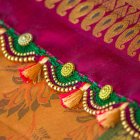 What is Saree Kuchu and How to Find the Perfect Saree Kuchu. 10 Must-Have Designs and Why You Should Use Them (2020)
What is Saree Kuchu and How to Find the Perfect Saree Kuchu. 10 Must-Have Designs and Why You Should Use Them (2020)
-
 Simple and Easy-To-Create Pongal Kolam Designs To Decorate Your Home Traditionally
Simple and Easy-To-Create Pongal Kolam Designs To Decorate Your Home Traditionally
-
 This Diwali, Prepare to Welcome Goddess Lakshmi with a Mix of Traditional and Contemporary Décor: Unique Diwali Decoration Ideas for Your Home to Make It Look Spectacular Like Never Before! (2020)
This Diwali, Prepare to Welcome Goddess Lakshmi with a Mix of Traditional and Contemporary Décor: Unique Diwali Decoration Ideas for Your Home to Make It Look Spectacular Like Never Before! (2020)
-
 Do You Know How Easy it is to Make an Envelope? Learn How to Make an Envelope in 4 Different Ways, What Paper to Use and Decoration Tips (2020)
Do You Know How Easy it is to Make an Envelope? Learn How to Make an Envelope in 4 Different Ways, What Paper to Use and Decoration Tips (2020)
-
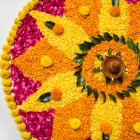 10 Exquisite Pongal Rangoli Designs to Celebrate the Harvest Festival With and Why You Should Practice This Ancient Art (2020)
10 Exquisite Pongal Rangoli Designs to Celebrate the Harvest Festival With and Why You Should Practice This Ancient Art (2020)
Navratri Decoration with Rangoli
Rangoli has both a religious and purity touch in it. Whether it is handmade Rangoli or purchased Rangoli, the significance of Rangoli is immense to decorate your home perfectly for Navratri. You can use it on the flooring of your pooja room, living room, drawing room, or any other room of your choice. When there is a puja, we just can’t think beyond Rangoli, simply because the decoration would not be perfect without Rangoli. This is certainly a worth trying tip for Navratri.